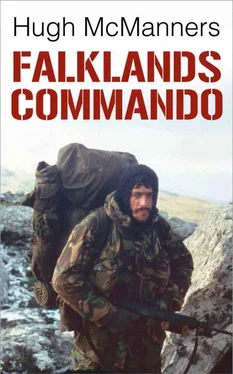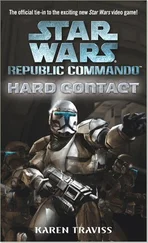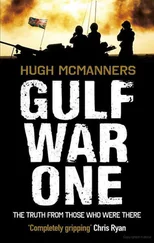Hugh McManners - Falklands Commando
Здесь есть возможность читать онлайн «Hugh McManners - Falklands Commando» весь текст электронной книги совершенно бесплатно (целиком полную версию без сокращений). В некоторых случаях можно слушать аудио, скачать через торрент в формате fb2 и присутствует краткое содержание. Город: London, Год выпуска: 2014, ISBN: 2014, Издательство: Nightstrike Publishing, Жанр: nonf_military, Биографии и Мемуары, на английском языке. Описание произведения, (предисловие) а так же отзывы посетителей доступны на портале библиотеки ЛибКат.
- Название:Falklands Commando
- Автор:
- Издательство:Nightstrike Publishing
- Жанр:
- Год:2014
- Город:London
- ISBN:978-0-992-81540-0
- Рейтинг книги:4 / 5. Голосов: 1
-
Избранное:Добавить в избранное
- Отзывы:
-
Ваша оценка:
- 80
- 1
- 2
- 3
- 4
- 5
Falklands Commando: краткое содержание, описание и аннотация
Предлагаем к чтению аннотацию, описание, краткое содержание или предисловие (зависит от того, что написал сам автор книги «Falklands Commando»). Если вы не нашли необходимую информацию о книге — напишите в комментариях, мы постараемся отыскать её.
Falklands Commando — читать онлайн бесплатно полную книгу (весь текст) целиком
Ниже представлен текст книги, разбитый по страницам. Система сохранения места последней прочитанной страницы, позволяет с удобством читать онлайн бесплатно книгу «Falklands Commando», без необходимости каждый раз заново искать на чём Вы остановились. Поставьте закладку, и сможете в любой момент перейти на страницу, на которой закончили чтение.
Интервал:
Закладка:
While we’d been ashore on Brewers Arms, the air raids had stopped, the Argie Air Force having seemingly run out of steam. Everyone was much more relaxed on the ships, and Intrepid had been busy ferrying 5 Infantry Brigade ashore, who’d just arrived from the UK. They’d put the Welsh Guards ashore at San Carlos, but a few days later had to pick them up again after they’d got cold and wet. My Navy friends in the Wardroom were confused, nonplussed and in some cases angry after sheltering the Welsh Guards, and because I was an Army officer, wanted to tell me about what had happened.
The Navy are well-used to having the Royal Marines and Army green-beret members of Commando Forces on board. They therefore assumed that the Welsh Guards would be something similar. However it had rapidly become clear even to the saltiest of sailors that the Welsh Guards were nothing like as well prepared as they needed to be. After confusions and difficulties, Intrepid had put the soldiers ashore, only to be recalled to pick them up again. This entailed a lot of extra work, with the LCMs ferrying the troops back on board, and much disruption of a ship that is difficult to operate even under normal circumstances. The sailors were shocked at the condition of the Welsh Guards when they returned after just a night or so ashore: wet, filthy, miserable – and obviously ineffective. Their yardstick was 3 Commando Brigade, who come back on board after arduous exercises in good order – even if we do leave muddy boot prints throughout their freshly cleaned ship.
With six hundred demoralised, dirty troops all trying to shower, wash clothing, eat and rest, the ship was in chaos. Then military equipment and personal belongings started going missing. One of my friends complained to the Welsh Guards hierarchy after his military equipment store was raided, to be told there was little that could be done. A senior Welsh Guards officer told him ruefully: “Taffy is a Welshman, Taffy is a thief.” Helping yourself to other people’s cassette-radio players was clearly stupid, particularly as the Welsh Guards were only to stay on Intrepid long enough to get dried out, rested and re-organised. The sensible man carried extra hand grenades rather than a stolen boogie box.
Intrepid’s crew were very relieved when the Welsh Guards moved out – into the two ill-fated Royal Fleet Auxiliary ships Sir Tristram and Sir Bedivere , that were so soon to be bombed at Bluff Cove.
The day after our subdued attempt at having a wake for Kiwi Hunt (8 June), we were hung over in spite of having drunk very little, washed out physically, with our freshly dhobied clothes wet and drying out in front of warm air vents. Into this scene of tired domestic chaos, 148 Battery’s Captain Bob Harmes arrived with the news that we were immediately to go back out into the field, to a most alarming forward position well behind enemy lines, overlooking the final objective, Port Stanley. Nick Allin and I just looked at each other and sighed wearily.
Stanley Harbour Map
We were to join D Squadron of 22 SAS, who already had a four-man patrol in the area. As they were all residing in the RFA Sir Lancelot , we were to change ships at once.
Getting ready to move across the RFA Sir Lancelot the day after we got back in after Brewers Arms was far from easy. All our clothes were wet, having been washed by us in the heads as soon as we got back on board. I’d completely dismantled all my webbing and emptied my bergen to clean out the mud, soaked rations and spare ammunition (that was going rusty). I was cleaning my Armalite and 9mm pistol when Bob Harmes came on board, and the bits were spread out, all over the cabin.
Bob did not know, and neither of us could guess for how long we were required to go out, nor did he know exactly what we were supposed to be doing. I was told initially that my task was to get onto Beagle Ridge with the aim of hitting the Hercules supply aircraft that the Argies were flying in and out of Port Stanley every night, as well as observing and sending back information.
The brigade staff, who were developing plans to attack Port Stanley from the western, landward side, wanted to get us into an observation position overlooking Port Stanley as soon as possible. It looked as though once there, it would be up to us to do what we thought best to support this plan, even though we would be told very little about the details.
All this quite understandable uncertainty added to the tension of the desperate rush of getting ourselves together and on to Sir Lancelot, in less than two hours. [12]
As usual, having rushed around the ship like headless chickens to get the radio batteries recharged, weapons cleaned and reassembled, codes and maps prepared, rations packed and webbing and bergens packed and balanced… we had to spend the rest of the day waiting for transport across San Carlos Water to the RFA. The well-known military motto ‘Rush to Wait’ is particularly applicable in war.
As we sat in the cold on Intrepid ’s flight-deck waiting to move to Sir Lancelot, the mail arrived . We all got letters except Des, who hadn’t had one for a while and was very fed up about it. We read him bits from ours to cheer him up. Then someone gave him a thick envelope – the long awaited letter from his wife. He said he hoped we wouldn’t mind if he read it through on his own, and moved to the other side of the crowded deck. We suspected things weren’t going well with Des and his wife…
The lull in the Argentine air campaign turned out to be temporary. 8 June was a very bad day with the fleet being constantly stood to for raids, then stood down. Our trip to Sir Lancelot was delayed until late afternoon, then, as we finally set off in an LCM, we were caught in open water when two more raids came in. The landing craft could do nothing except heave-to until the strike was over.
After an hour and a half in the cold LCM, we came alongside Sir Lancelot, which was rolling in quite a stiff swell. There were only Chinese seamen who spoke no English at the rail, so a ‘white man’ was summoned… The stern ramp was broken and could not be lowered to allow us to unload directly into the hold. We had to climb from the heaving LCM up a rope scramble net on to the upper deck, and then pull the heavy bergens up by rope.
I made my way to Sir Lancelot’s wardroom to find the SAS squadron commander Euen Houston. It was getting late in the afternoon and the SAS’ evening orders, known as ‘Prayers’, were in progress in their makeshift office, with maps around the walls and ashtrays full of cigar butts. I’d missed most of it, but they went through it all again.
Sir Lancelot was a sitting target and had actually been hit by an Argentine iron bomb. Like all the RFAs, she’d survived many air attacks, being strafed by cannon and straddled by bombs. Thankfully the bomb had not exploded but had done considerable damage, which under less extreme circumstances would have required immediate and extensive repairs. The bomb had been released at very low level, lobbed into the port side of Lancelot at the top of her superstructure. Its weight and momentum had penetrated diagonally all the way down through the centre of the ship, then out through the other side just above the waterline.
The hole was large, the bomb’s wide, jagged trajectory smashing through walls, equipment and steel decks. Looking from the top of the ship, you could see all the way through to the choppy grey waters below on the other side. From the ships’ usually dark lower decks, you could see the sky.
Читать дальшеИнтервал:
Закладка:
Похожие книги на «Falklands Commando»
Представляем Вашему вниманию похожие книги на «Falklands Commando» списком для выбора. Мы отобрали схожую по названию и смыслу литературу в надежде предоставить читателям больше вариантов отыскать новые, интересные, ещё непрочитанные произведения.
Обсуждение, отзывы о книге «Falklands Commando» и просто собственные мнения читателей. Оставьте ваши комментарии, напишите, что Вы думаете о произведении, его смысле или главных героях. Укажите что конкретно понравилось, а что нет, и почему Вы так считаете.












